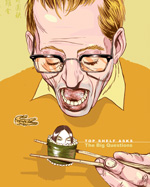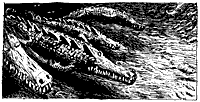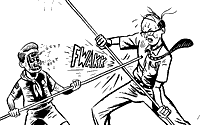
 Contributors include Chris Ware, Seth, Ivan Brunetti, Joe Matt, Tony Millionaire, Tom Hart, Jason Martin, Tom Dieck, Nicolas Mahler, Ulf K, Winshluss, Atrabile, Matt Madden, Renée French, Josh Simmons, Jesse Reklaw, Mack White, James Kochalka, James Sturm, Steve Weissman, Peter Kuper, the Robot Publishing Posse, David Chelsea, Tomer Hanuka, Alan Moore and Melinda Gebbie
Contributors include Chris Ware, Seth, Ivan Brunetti, Joe Matt, Tony Millionaire, Tom Hart, Jason Martin, Tom Dieck, Nicolas Mahler, Ulf K, Winshluss, Atrabile, Matt Madden, Renée French, Josh Simmons, Jesse Reklaw, Mack White, James Kochalka, James Sturm, Steve Weissman, Peter Kuper, the Robot Publishing Posse, David Chelsea, Tomer Hanuka, Alan Moore and Melinda Gebbie
Editors: Brett Warnock, Robert Goodin
Price: $24.95
Publisher: Top Shelf
ISBN: 1891830325
While I'm pretty sure that co-editor Brett Warnock had no such intention in mind when he thought up the title to this anthology years ago, the newest instalment of the Top Shelf anthology series does exactly what it claims to in the title, namely, asking the big questions, the main one being, "Are there too many high-end art-comics anthologies out there these days for audiences to appreciate the differences in quality between them?"
There is no denying that art-comics, as the occasionally more restrained offspring of underground comics, have a history with the anthology format that dates back to their very genesis. It is impossible to discuss the evolution of modern art-comics as a form without referencing anthologies all along the way like ZAP, RAW, ARCADE, WIMMEN'S COMIX, WEIRDO, DRAWN AND QUARTERLY, and even early editions of TOP SHELF, where I myself first caught the works of luminaries like James Kochalka, Tom Hart, Steven Weissman, and Josh Simmons.
Yet the trend of late in anthologies has been towards transforming the art-comics anthology, typically a format that offered many pages inexpensively to the customer to off-set the inevitable percentage of material that did not mesh with their individual tastes, into an objet d'art that reflects in both price and production value the lofty aesthetic goals of the material within.
The problem, at least for this reader, retailer, and reviewer, is that there may be a finite amount of space available on the bookshelves of potential readers for these anthologies, added as they often are to the tune of twenty dollars American with each new variation on the theme.
 Add to this a sense of identity crisis resulting from the close-knit nature of indy comics that sees many of the same creators contributing to each of these high-profile anthologies and you end up with a sense of muted enthusiasm as each new one tries to top the one before it, not in quality but in sheer production bravado.
Add to this a sense of identity crisis resulting from the close-knit nature of indy comics that sees many of the same creators contributing to each of these high-profile anthologies and you end up with a sense of muted enthusiasm as each new one tries to top the one before it, not in quality but in sheer production bravado.
So, despite looking forward to its release for nearly three years, it was with no small sense of trepidation that I cracked the cover to TOP SHELF ASKS THE BIG QUESTIONS and got all the answers. In a field of imitators and admirers, ASKS THE BIG QUESTIONS succeeds as both an heir to its own legacy of quality from earlier volumes and as a pacesetter for other companies seeking to make a name for themselves with this type of material.
At first glance, the contributors appear to be separable into distinct camps: people normally affiliated with Top Shelf (Dean Haspiel, Tom Hart, Steven Weissman, Josh Simmons, Bwana Spoons, Wayne Shellabarger, Renee French, James Kochalka), people affiliated with co-editor Rob Goodin's Robot Publishing efforts (Andrew Brandou, Joy Kolitsky, Anthony Vukojevich, Jennifer Yuh Nelson, Cathy Malkasian, Michael Kenny), Indy All-Stars that can sometimes sell a whole book on their involvement (Chris Ware, Ivan Brunetti, Seth, Jason, Tony Millionaire, James Sturm, Joe Matt), and an eclectic variety of European artists, the smallest percentage of which have seen substantial publication in the Anglophone comics market.
Yet, for every contributor that falls easily into one of these groups, there are a handful of surprises that do not. One of many such highlights for me is the interview with cartoonist David Chelsea (whom I knew nothing about before reading it here) that accompanies several pages of his comics and illustration work.
It has always been my belief that a quality anthology should inform as well as entertain, with the editor(s) acting as DJ, mixing up quirky, yet recognisable favourites alongside totally unfamiliar material that broadens the avenue of my own exploration in a favourable way when I'm finished, and that pretty much describes my experience with ASKS THE BIG QUESTIONS to a T.
 The various contributions in ATBQ are grouped according to format (paper type, ink colour), creating sub-sections to the book that are occasionally thematically linked and that work a little like chapters, giving the reader a sense of progression by changing the mood to fit the piece as the page count stretches on well over 300 pages.
The various contributions in ATBQ are grouped according to format (paper type, ink colour), creating sub-sections to the book that are occasionally thematically linked and that work a little like chapters, giving the reader a sense of progression by changing the mood to fit the piece as the page count stretches on well over 300 pages.
One of the more immediately accessible sections is the largest chunk of a tribute to Charles Schulz (other portions appear throughout the book according to format demands, while this section is printed with brown ink on cream paper), that showcases many of the "ringers" imported from other successful houses like Ware, Brunetti, etc while giving relative newcomers like David Lasky and Warren Craghead a highlighted forum to turn in remarkable, expressive pieces.
Also of particular note was the inclusion of an Alan Moore/Melinda Gebbie piece (along with a particularly naughty advertisement for the upcoming Top Shelf release of LOST GIRLS in 2004) that was originally banned by DC/Wildstorm from publication in Moore's bizarre anthology from the ABC comics line, TOMORROW STORIES.
Ever-so-slightly adapted to get around copyright concerns, "Brighter Than You Think" is an EC style retelling of the life of scientist and magician, John Whiteside Parsons, verboten by DC because it catalogues only a few of the many sordid affairs that make up the life history of Scientology founder L Ron Hubbard in the process of this high magic morality tale. To an unprepared reader, this narrative-driven piece's appearance amidst a sea of largely artist-dominated work is probably a little jarring, but the blow is no doubt softened by Gebbie's sensual linework that is both smartly coloured and immaculately reproduced on great paper.
It is a testament to the patience and dedication of both editors, and, indeed, all the contributors involved, that TOP SHELF ASKS THE BIG QUESTIONS turned my initial concerns about reading "just another mind-blowing anthology from the same old folks" into an experience that was entertaining, intriguing, and informative.
It is obvious that Warnock and Goodin were cognisant of the potential hazards in putting out an art-comics anthology these days, and spent the extra time finding material that was engaging, substantive, and, except in the rarest cases, not being reprinted for an audience that has likely already seen the material in the interest of fattening the contributor's roster.
In the end, Top Shelf not only ASKS THE BIG QUESTIONS (like "Are there too many high-end art-comics anthologies being put out these days to appreciate the differences in quality between them?") but answers with a resounding, "No. But let us show you."

This article is Ideological Freeware. The author grants permission for its reproduction and redistribution by private individuals on condition that the author and source of the article are clearly shown, no charge is made, and the whole article is reproduced intact, including this notice.


